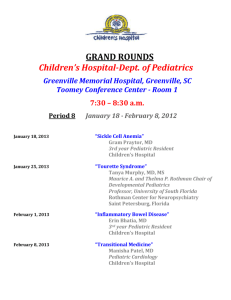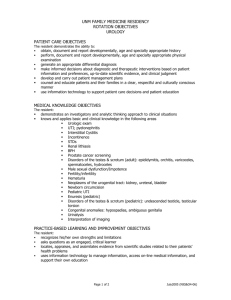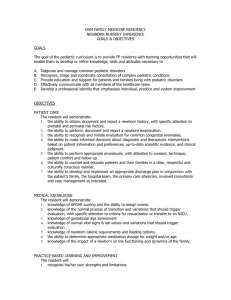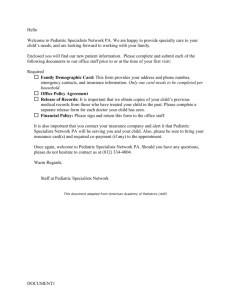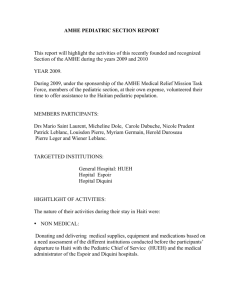Pediatric Orthopaedics - UWO - Division of Orthopaedic Surgery
advertisement
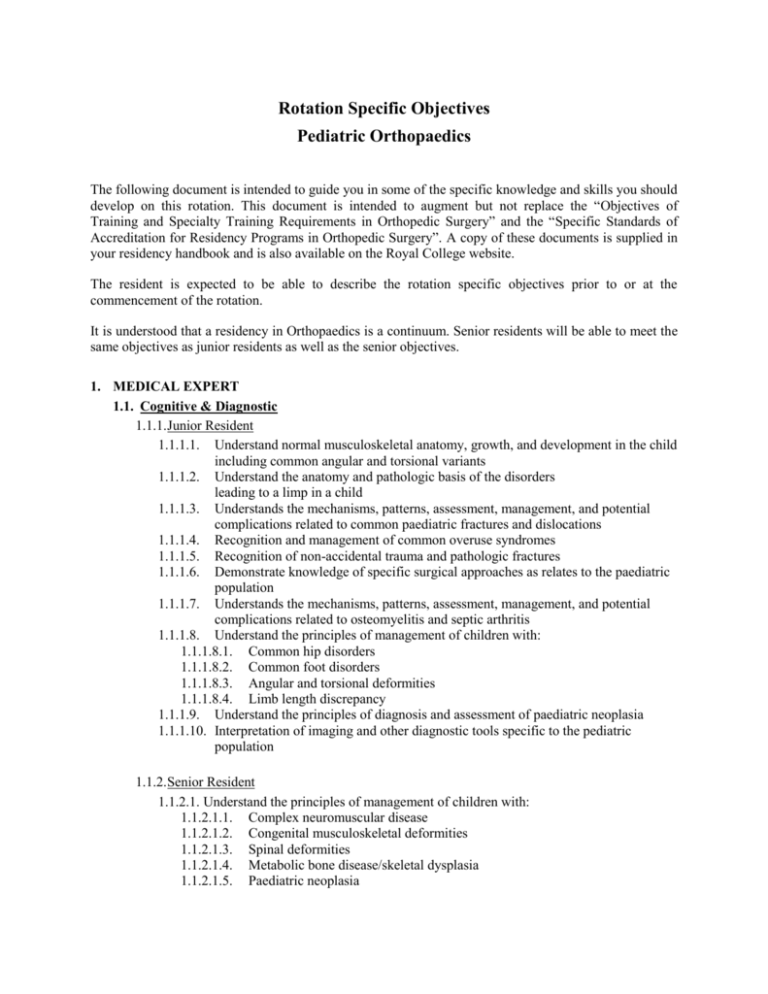
Rotation Specific Objectives Pediatric Orthopaedics The following document is intended to guide you in some of the specific knowledge and skills you should develop on this rotation. This document is intended to augment but not replace the “Objectives of Training and Specialty Training Requirements in Orthopedic Surgery” and the “Specific Standards of Accreditation for Residency Programs in Orthopedic Surgery”. A copy of these documents is supplied in your residency handbook and is also available on the Royal College website. The resident is expected to be able to describe the rotation specific objectives prior to or at the commencement of the rotation. It is understood that a residency in Orthopaedics is a continuum. Senior residents will be able to meet the same objectives as junior residents as well as the senior objectives. 1. MEDICAL EXPERT 1.1. Cognitive & Diagnostic 1.1.1. Junior Resident 1.1.1.1. Understand normal musculoskeletal anatomy, growth, and development in the child including common angular and torsional variants 1.1.1.2. Understand the anatomy and pathologic basis of the disorders leading to a limp in a child 1.1.1.3. Understands the mechanisms, patterns, assessment, management, and potential complications related to common paediatric fractures and dislocations 1.1.1.4. Recognition and management of common overuse syndromes 1.1.1.5. Recognition of non-accidental trauma and pathologic fractures 1.1.1.6. Demonstrate knowledge of specific surgical approaches as relates to the paediatric population 1.1.1.7. Understands the mechanisms, patterns, assessment, management, and potential complications related to osteomyelitis and septic arthritis 1.1.1.8. Understand the principles of management of children with: 1.1.1.8.1. Common hip disorders 1.1.1.8.2. Common foot disorders 1.1.1.8.3. Angular and torsional deformities 1.1.1.8.4. Limb length discrepancy 1.1.1.9. Understand the principles of diagnosis and assessment of paediatric neoplasia 1.1.1.10. Interpretation of imaging and other diagnostic tools specific to the pediatric population 1.1.2. Senior Resident 1.1.2.1. Understand the principles of management of children with: 1.1.2.1.1. Complex neuromuscular disease 1.1.2.1.2. Congenital musculoskeletal deformities 1.1.2.1.3. Spinal deformities 1.1.2.1.4. Metabolic bone disease/skeletal dysplasia 1.1.2.1.5. Paediatric neoplasia 1.1.2.2. Understand mechanisms, patterns, assessment, management, and potential complications related to complex paediatric fractures and dislocations 1.1.2.3. Understand the anatomy, pathology, assessment, and management complex hip disorders 1.1.2.4. Understand the principles of management of paediatric polytrauma 1.1.2.5. Understand the principles of operative management of: 1.1.2.5.1. hip dysplasia in normal and neuromuscular patients 1.1.2.5.2. clubfeet 1.1.2.5.3. spinal deformity 1.2. Technical 1.2.1. Junior Resident 1.2.1.1. Assessment and management of simple fractures including appropriate analgesia/anesthesia techniques 1.2.1.2. Demonstrate proficiency in clinical examination in the following areas: 1.2.1.2.1. assess the limping child 1.2.1.2.2. the hips of infants and children including Barlow and Ortolani maneuvers 1.2.1.2.3. General limb length 1.2.1.2.4. Scoliosis examination 1.2.1.3. Demonstrate the ability to: 1.2.1.3.1. perform percutaneous pinning of fractures 1.2.1.3.2. apply skin and skeletal traction 1.2.1.3.3. apply a Pavlik harness 1.2.2. Senior Resident 1.2.2.1. Assessment and management of complex paediatric fractures including: 1.2.2.1.1. physeal injuries 1.2.2.1.2. compound fractures 1.2.2.1.3. multiple trauma 1.2.2.1.4. compartment syndrome, and neurovascular compromise 1.2.2.2. carry out non operative treatment of children’s clubfoot 1.2.2.3. Operative management of: 1.2.2.3.1. Septic arthritis including arthogram and arthrotomy 1.2.2.3.2. Osteomyelitis 1.2.2.3.3. Slipped capital femoral epiphysis 1.2.2.4. Management of benign bone conditions 1.2.2.5. Perform appropriate investigation including biopsy for suspected paediatric neoplasia 1.2.2.6. Demonstrate the ability to apply a hip spica cast 2. COMMUNICATOR 2.1. Understands the role of communication in fostering patient satisfaction and compliance as it relates to pediatrics, parents and care givers 2.2. Elicits psychosocial information pertinent to the health of the patient including; socioeconomic background, ethnic, cultural, and spiritual values 2.3. Demonstrates the ability to deliver information to the pediatric patient and their support group in a way which is understandable 2.4. Understands and obtains informed consent using medical knowledge and awareness of current consent legislation and the Canada Health Act 2.5. Demonstrate the ability to describe procedures to the pediatric patient and patient support group 3. COLLABORATOR 3.1. Junior Resident 3.1.1. Demonstrate an understanding of the unique collaborative nature of pediatric care 3.1.2. Understand and develops patient care plan with other members of the inter professional health care team 3.1.3. demonstrate the ability to work within an inter professional team in regards to research and administrative duties 3.2. Senior Resident 3.2.1. Demonstrate the ability to lead an inter professional team 3.2.2. Develop a care plan, integrate all members of the team needed and follow the plan to completion in regards to medical or nonmedical issues around the care of the pediatric orthopedic patient 4. MANAGER 4.1. Junior Resident 4.1.1. Access and allocate finite health care efficiently within a health care organization 4.1.2. Understand the structure, financing, and operation of the health care system and function effectively within it 4.2. Senior Resident 4.2.1. Lead the physician team and allocate manpower resources in regards patient care 4.2.2. Understand the role of the physician in regards to administrative duties in the health care 4.2.3. Demonstrate the ability to manage time allocation to inter and intra personal learning and duties 5. HEALTH ADVOCATE 5.1. Junior Resident 5.1.1. recognizes and understands the psychological, social, and physical determinants of patient health 5.1.2. Understand patient advocacy issues in regards to family, care giver and social care network 5.1.3. Understands the medico legal obligations associated with non accidental trauma 5.1.4. Recognize the emotional stress for patients and families faced with orthopedic conditions and optimize psychosocial support network for the pediatric patient 5.2. Senior Resident 5.2.1. Promotion of the determinants of health in the community at large as it relates to the pediatric population 5.2.2. Demonstrate the knowledge of resources available to those patients in need of community based care 5.2.3. Understand the role of community based advocacy in regards to patients with special needs 5.2.4. Demonstrate the need to serve as a patient advocate for scarce resources for the patient with special needs 6. SCHOLAR 6.1. Junior Resident 6.1.1. Demonstrates ability for self directed learning and critical appraisal of the literature 6.1.2. Demonstrate stratified level of knowledge of pediatric orthopedics with teaching of the junior members of the pediatric health care team 6.1.3. Recognize gaps in knowledge and implement a plan to improve their knowledge base 6.2. Senior Resident 6.2.1. Demonstrates the ability to resolve previously identified deficits in knowledge and technical skills 6.2.2. Identify possible areas of research in pediatric orthopedics 6.2.3. Continue to develop teaching models for patient and colleague education 7. PROFESSIONAL 7.1. Junior Resident 7.1.1. Demonstrates the ability to work within the scope of clinical and technical acumen and obtains responsible and timely patient referrals 7.1.2. Practice ethically consistent with the obligations of a physician and expectation of the community in regards to gender, culture, ethnicity, race, spiritual values and socioeconomic standard 7.1.3. Demonstrates the ability to put patient and parents at ease and inspire confidence in the treatment plan 7.2. Senior Resident 7.2.1. provides efficient, authoritative consultation to the referring source 7.2.2. Serve as a role model to the junior members of the health care team in regards to a balance between professional and personal roles. 7.2.3. Understand the legislation in regards to treatment of the pediatric patient or patients otherwise unable to understand the scope of treatment needed for care 7.2.4. Demonstrates ability to identify and remediate weakness in their managerial, administrative or education skills in regards to care of the pediatric patient
